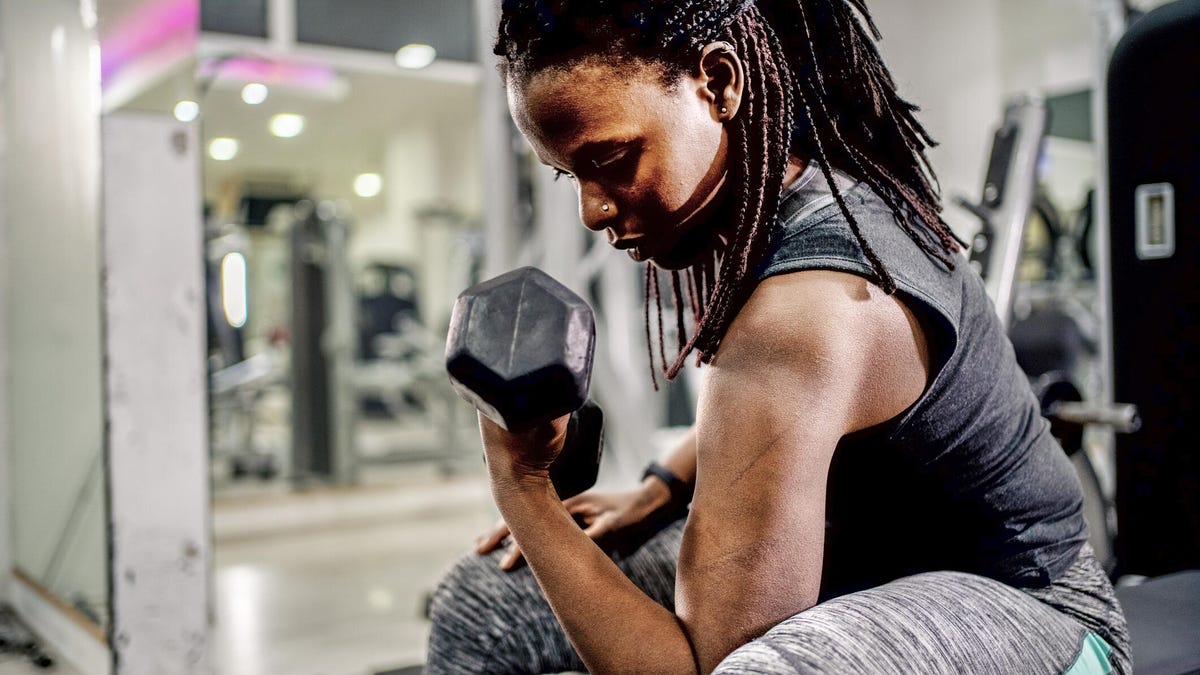How many reps do you need to build muscle? It depends on your goals
Contrary to popular belief, more reps aren't necessarily better.

More reps or more weight? That is the question.
Building muscle is a challenging, tumultuous, rewarding process. It takes a great deal of determination and effort -- just like losing weight, building muscle is certainly not easy. Planning is particularly key.
If you hit the weights without a plan, the difficulty of building muscle intensifies because meeting a goal requires consistency. Having a plan is the best way to ensure consistency and also helps you avoid overtraining or undertraining, both of which will deter you from your goals.
In other words, you could reach your muscle-definition goals a heck of a lot faster if you know exactly what to do each time you walk into the gym (or your living room, garage or wherever you work out).
While I can't build you a personalized resistance-training plan guaranteed to help you build muscle (you'd have to hire a personal trainer for that), I can tell you exactly how many reps you should lift to build muscle and enhance your physique.
Read more: The 7 most important workout moves you should be doing all the time
The best rep range for building muscle
To lose fat, increase muscle definition and enjoy the health benefits of having a muscular body -- like stronger bones and a lower risk of chronic disease -- you should lift weights for muscle growth.
Numerous research studies show that high-volume resistance training is the best method for building muscle. According to the American Council on Exercise, the eight to 15 rep range holds the most muscle-building potential.
To maximize muscle growth, you should choose a weight that brings you to fatigue, but not failure, by the last rep. Lifting to fatigue means you continue performing reps until you're on the brink of losing good form. The moment you feel your technique falter, end your set.
Lifting to failure means performing reps until you physically cannot perform another rep, and often means ending the set with an incomplete rep. Most trainers don't recommend lifting to failure, unless you're under professional supervision or are an advanced lifter with great exercise form.
Read more: Lifting heavy weights vs. light weights: Which is better?
The best rep range for building muscle may come as a surprise.
The best rep range for getting stronger
If you want to focus more on pure strength, you'll want to lift fewer reps with heavier weights.
The proven rep range for increasing strength is one to six reps. This makes sense, because there's an inverse relationship between reps and load: If you do more reps, you'll have to use less weight. Conversely, if you do fewer reps, you should be able to increase the weight.
Strength gains occur in response to heavy loads that challenge your muscles. If you don't consistently increase the weight you use over time, your strength building will stall.
While more muscle is typically associated with more strength, that's not always the case. Some lifters with impressive physiques may look strong, but research shows that high-volume resistance training can increase muscle mass without increasing strength.
Sure, people who are strong usually have big muscles, but they also have phenomenal mobility, stability and exercise technique, which all contribute to strength. You can have big muscles without having the other characteristics it takes to truly be strong in a particular weightlifting move.
So, to increase strength, lift one to six reps and improve your mobility, stability and technique.
Read more: How to slow down your workouts for better results
Lifting a lot of weight for just a few reps isn't necessarily the ticket to muscle town.
The best rep range for building endurance
If you love outdoor recreational activities and sports, or if you have a laborious job, consider lifting weights for muscular endurance.
Muscular endurance refers to how long your muscles can keep moving under a given load. This differs from cardiovascular endurance and offers its own set of benefits, particularly increased stamina, which allows you to easily perform repetitive activities such as gardening or washing your car.
Having good muscular endurance also opens you up to a world of recreational opportunities like hiking and kayaking. To improve muscular endurance through weight lifting, lift 15 or more reps for each set.
Weight training for endurance usually incorporates short rest periods in addition to high rep ranges, so you should expect to use much less weight than you would use when trying to build muscle or strength.
Working to fatigue or failure isn't necessary if your goal is to build endurance. Keep your focus on improving aerobic efficiency and you'll be good to go.
Read more: Does lifting weights make women bulky?
The best rep ranges for building muscle, strength and endurance.
The best rep range for losing weight
Here's a fun fact: You need not slave away at the treadmill to lose weight. Lifting weights can also help you lose weight and keep it off. When lifting weights for weight loss, the rep range isn't nearly as important as just doing the work, especially if you're a beginner.
Lifting weights helps you lose weight in two ways:
- First, it's exercise, so it can put you in a calorie deficit, which is the only real way to lose weight.
- Second, lifting weights at any rep scheme helps build at least some muscle. Muscle is a very metabolically active tissue, meaning it uses up a lot of energy, and can increase the number of calories you burn both at rest and while doing regular daily activities.
High-volume resistance training elicits more of a cardio-like response, and it may burn more calories per session than low-volume resistance training. Weight training for strength, muscle mass and endurance can all benefit your weight loss efforts.
Read more: The most effective workouts for getting in shape fast

